Scaling up integrated primary mental health in six low- and middle-income countries: obstacles, synergies and implications for systems reform

View/
Date
2019-08-06Author
Petersen, Inge
Rensburg, André van
Kigozi, Fred
Semrau, Maya
Hanlon, Charlotte
Abdulmalik, Jibril
Kola, Lola
Fekadu, Abebaw
Gureje, Oye
Gurung, Dristy
Jordans, Mark
Mntambo, Ntokozo
Mugisha, James
Muke, Shital
Petrus, Ruwayda
Shidhaye, Rahul
Ssebunnya, Joshua
Tekola, Bethlehem
Upadhaya, Nawaraj
Patel, Vikram
Lund, Crick
Thornicroft, Graham
Metadata
Show full item recordAbstract
There is a global drive to improve access to mental healthcare by scaling up integrated mental health into primary healthcare (PHC) systems in low- and middle-income countries (LMICs).
Aims
To investigate systems-level implications of efforts to scale-up integrated mental healthcare into PHC in districts in six LMICs.
Method
Semi-structured interviews were conducted with 121 managers and service providers. Transcribed interviews were analysed using framework analysis guided by the Consolidated Framework for Implementation Research and World Health Organization basic building blocks.
Results
Ensuring that interventions are synergistic with existing health system features and strengthening of the healthcare system building blocks to support integrated chronic care and task-sharing were identified as aiding integration efforts. The latter includes (a) strengthening governance to include technical support for integration efforts as well as multisectoral collaborations; (b) ring-fencing mental health budgets at district level; (c) a critical mass of mental health specialists to support task-sharing; (d) including key mental health indicators in the health information system; (e) psychotropic medication included on free essential drug lists and (f) enabling collaborative and community- oriented PHC-service delivery platforms and continuous quality improvement to aid service delivery challenges in implementation.
Conclusions
Scaling up integrated mental healthcare in PHC in LMICs is more complex than training general healthcare providers. Leveraging existing health system processes that are synergistic with chronic care services and strengthening healthcare system building blocks to provide a more enabling context for integration are important.
